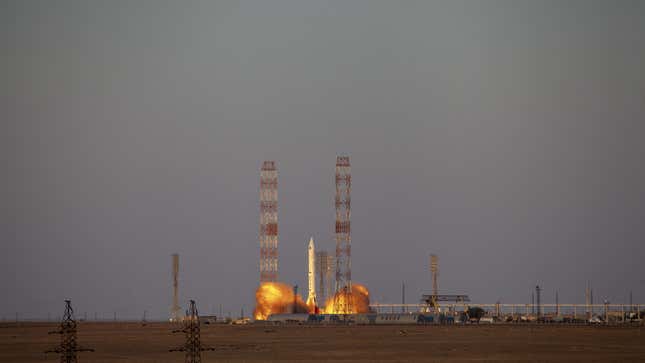
Russia’s new space station module, dubbed Nauka, is currently en route to the ISS, but the spacecraft initially failed to complete its first orbit-raising burn, leading to concerns that it might not complete the trip. Thankfully, the Nauka team on Earth was able to perform a course correction, and the module is now in the proper orbit to continue its journey.
Nauka, it would appear, is taking its bad luck along with it into space.
The Russian Multipurpose Laboratory, as its formally known, has been in the works since the late 1990s, and it was supposed to launch back in 2007, but an array of technical problems—from dirty fuel tanks through to aging components—prevented this from happening. Two components of the module, the airlock and a radiator, were launched to the ISS 11 years ago, where they’ve been lying in wait ever since.
The big day finally arrived yesterday when Nauka, along with Europe’s new robotic arm, launched from the Baikonur Cosmodrome in Kazakhstan atop a Proton-M rocket. The launch appeared to go well, with the 43,300-pound module reaching orbit and completing all three separation stages. The module is expected to arrive at the International Space Station on July 29, at which time it will dock to the nadir port of Russia’s Zvezda module.
Earlier today, the entire mission seemed in peril as reports emerged of a problem with its onboard computer that prevented the use of its main engines to complete its first orbit-raising engine burn. Nauka needs these engines to make course corrections that will take it to the ISS and to prevent it from falling into Earth’s atmosphere. At 3:10 p.m. EDT on July 22, however, Roscosmos tweeted that the test-firing of Nauka’s propulsion system and the orbit correction burn were nominal. Nauka, it appears, is back on track.
That said, the undocking of the Pirs Docking Compartment was moved from this coming Friday, July 23 to Saturday, July 24 at 8:00 p.m. EDT. Pirs is currently occupying Nauka’s eventual docking slot, and it will only be removed once Nauka is confirmed as being satisfactorily en route to the ISS.
In an email, Jonathan McDowell, an astrophysicist at the Harvard-Smithsonian Center for Astrophysics, said “a software error caused a problem in the main engines,” making them unusable for a while. The initial burn, he said, would have to be made with “smaller backup engines.” It’s not yet known if Roscosmos used the main thrusters, or the backup system.
Today’s problem with the main thrusters is apparently not the only issue currently facing the mission. As SpaceNews reports, those problems include “the inability to confirm that an antenna and docking target deployed as expected, as well as issues with infrared sensors and thrusters.” It’s not “immediately clear how serious the problems were and if they would affect plans for docking,” according to SpaceNews.
Any trouble that would prevent the Nauka module’s successful docking with the ISS would obviously be a major blow to Russia’s space station program, which has struggled lately with aging infrastructure and U.S. sanctions directed at its space industry.